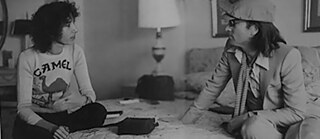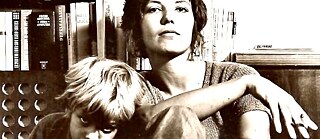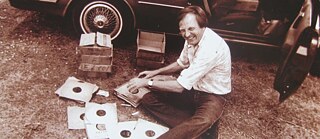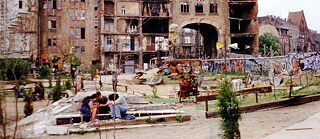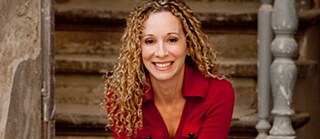A Career-Defining Moment
A Day With John Lennon
In 1975, German journalist Frances Schoenberger had the chance to speak to John Lennon, but the interview was never published — until now. Here, Schoenberger listens to it for the first time, 40 years later.
Listen to this episode: Apple Music | Spotify | Download
This episode is by Kerstin Zilm. Kerstin came to Los Angeles in 2003 with Germany’s public broadcasting network ARD. When the assignment ended, she decided to stay in California where she created her own production company and became an independent journalist. In this podcast, Kerstin speaks with the journalist Frances Schoenberger. We also hear archival interview recordings of John Lennon. The featured photo of Frances Schoenberger and John Lennon was taken by legendary rock‑’n’-roll photographer Bob Gruen in 1975. In addition to this episode, Kerstin Zilm produced the episodes “Klinsmann in California” and “Villa Aurora and Thomas Mann House in Los Angeles.”
Transcript
Frances Schoenberger: I don’t know how that works. Ah! There we go. Oooh, oh yay — I am a little nervous about it.
[AMBI1 FRANCES TRYING TO GET THE CD PLAYER TO START]Kerstin Zilm: Frances Schoenberger tries to get her CD player to start. She is sitting in the sunny living room in her hillside home overlooking the city of Los Angeles. She has interviewed every musician, filmmaker, and actor making headlines the last 50 years — from Alfred Hitchcock to Frank Zappa. She is still an active reporter and member of the Hollywood Foreign Press Association, which awards the Golden Globes every year.
Now she wants to listen to an interview she did on March 28th, 1975, with musical icon John Lennon.
At the time of the interview, Schoenberger was 30 years old. She worked as rock-and-roll and Hollywood reporter for the German magazine Bravo. She grew up in a tiny, Catholic village in Bavaria, left home when she was 13, and a few years later worked as assistant to a famous German journalist in Munich.
Frances Schoenberger created her life in the United States from scratch. In 1975, she had already interviewed a lot of celebrities for German magazines and newspapers. John Lennon was on her list for a long time.
Frances Schoenberger: From The Beatles, John Lennon interested me the most because he had the mother issues, he was more rebellious, and I loved his music the best. I was just so curious. And I kept writing and writing and writing letters asking for an interview.
Kerstin Zilm: The encounter with John Lennon turned out to be so special that Frances Schoenberger never listened to the tape, afraid that what she would hear might not live up to her memories — or have a negative impact on them. She is nervous.
Frances Schoenberger: Never listened. Only when I transcribed the interview. Well, I had somebody else transcribe it. I never listened to it again. I guess I will be able to handle it. Can you imagine? That’s 40 years later, right?
Kerstin Zilm: March 1975. John Lennon is back in New York and reunited with Yoko Ono after spending 18 months in Los Angeles. On the West Coast, he made headlines for partying excessively in Hollywood clubs. There were stories about dramatic scenes during recording sessions with producer Phil Spector. His relationship with May Pang, his and Yoko Ono’s former secretary, was fodder for gossip magazines all over the world. It was a relationship Ono had initiated.
On top of that, the ex-Beatle is in a legal fight with the United States over getting a green card. The government threatens to deport him because he overstayed his visa.
He has a number one hit on the charts with Elton John: “Whatever Gets You Thru the Night.”
At the same time, Frances Schoenberger lives on the other side of the continent, in Los Angeles, sending stories from Hollywood to Germany. In March, she goes back to New York, where her U.S. reporting career started. She stays in a hotel, preparing interviews. The opportunity to meet John Lennon comes out of nowhere.
Frances Schoenberger: I think I was there to interview Jane Fonda and somebody else. Then the photographer Bob Gruen — he was a rock-and-roll photographer I used to work with — he was basically John Lennon’s photographer, and then he said he is going to do it. I was shocked.
Kerstin Zilm: She immediately gets a different hotel room: bigger and with a view on Central Park. She knows that photographer Bob Gruen will need good shots. For her client, the German Pop magazine, pictures will be more important than her writing. The editors are not half as excited about the chance to interview John Lennon as she is. The Beatles had split up five years ago. Lennon’s career has hit a plateau. The magazine is more interested in stories about David Cassidy and Alice Cooper, ABBA, and the Bay City Rollers.
Frances Schoenberger: I think, at that time, they weren’t that impressed. It was for Bravo, and Bravo at that time was for teenagers. With this interview, we got so much deeper — which was not of any interest to Bravo readers. So I just had to pick the usual stuff.
Kerstin Zilm: When she gets the news that John Lennon will come to her hotel room, the journalist has no idea yet how deep the conversation will go. But she is determined to make the most of this opportunity. She gets prepared. The recorder is set with 90 minutes of tape. She has extra batteries, a notebook, pens ... and many questions.
Frances Schoenberger: I was sitting in my room waiting for John Lennon, all by myself. And suddenly somebody knocked on the door, and he was whistling. He came all by himself. No bodyguard, no press agent, nobody. Just him. So it was only him and me in my hotel room. So he came in and looked out the window and started to even speak a little bit of German, dirty German. He was in an amazingly good mood. Of course, I was very nervous. But I relaxed very quickly because he made me forget that it was John Lennon. I just felt very comfortable with him. That he walked New York and he came to my hotel room. I didn’t have to come down. He came up to see me. It’s pretty cool, yeah.
Kerstin Zilm: Schoenberger brings a black and white photograph from her office to the living room. Bob Gruen gave it to her.
The picture shows the reporter sitting on the bed talking with John Lennon. She wears dark bell-bottoms, a sweater with the Camel cigarette logo and picture on the front, her hair styled in a shoulder-length perm. She looks directly at John Lennon. Smiling. Curious. The recorder between them on the bed is not running.
Frances Schoenberger: No, I didn’t tape in the hotel room. Phhhhhh! When he spoke German and all this! I think it was my instinct. I wanted to make him feel comfortable. You don’t tape everything, so you establish some sort of trust so they can see I’m not greedy. I think I did that on purpose. Then you say: now we start the official interview and now this is on tape.
Kerstin Zilm: In the picture, Lennon leans towards her looking right into her eyes. He wears a light-colored three-piece suit with matching scarf, a flat hat, and his signature round rim glasses.
Frances Schoenberger: Bob Gruen told me that we would drive up to Yonkers and that there is a park. And while we are in the car I can do the interview, and then continue.
Kerstin Zilm: When Gruen arrives at the hotel, he takes a few pictures in the room, then he tells everybody to go downstairs and be ready for the ride to the park.
Schoenberger is shocked when she sees Gruen’s Toyota station wagon. It is small and the photographer has not bothered to clean it up.
Frances Schoenberger: His car was so messy. I was so embarrassed. And we were just sitting in the back seat of this tiny car and I held my tape recorder ...
Kerstin Zilm: She starts recording.
[AMBI2 FRANCES SIGHS/TAPE STARTS]
John Lennon: Do you know what you are going to ask? Otherwise, I just ramble ...
Frances Schoenberger: I know what I have been reading, and the latest I know is that you are suing them?
John Lennon: Yeah, John Lennon versus the U.S. It’s great ...
Frances Schoenberger: I know what I have been reading, and the latest I know is that you are suing them?
John Lennon: Yeah, John Lennon versus the U.S. It’s great ...
Kerstin Zilm: Now, more than 40 years later, Frances Schoenberger listens to her 30-year-old self riding in a car with John Lennon, the windows open, driving through Manhattan on a bumpy road — for the first time.
The interview starts with a topic that is in the news in 1975: Lennon’s legal fight with the U.S. government about getting a green card.
Frances Schoenberger: Why, John, do you want to live in New York now — or the States?
John Lennon: Because it’s more fun.
Frances Schoenberger: I agree.
John Lennon: I only decided to live here after I had moved here. I did not leave England with the intention. I left everything in England. I didn’t even bring any clothes. I just came for a visit and stayed. I like it here. You’re here.
Frances Schoenberger: I like it here.
John Lennon: Is anywhere better?
Frances Schoenberger: No. I also like the American people.
John Lennon: I do.
Frances Schoenberger: I like them. I really feel good here and I also want my green card. I don’t want to get kicked out.
John Lennon: Me too …
John Lennon: Because it’s more fun.
Frances Schoenberger: I agree.
John Lennon: I only decided to live here after I had moved here. I did not leave England with the intention. I left everything in England. I didn’t even bring any clothes. I just came for a visit and stayed. I like it here. You’re here.
Frances Schoenberger: I like it here.
John Lennon: Is anywhere better?
Frances Schoenberger: No. I also like the American people.
John Lennon: I do.
Frances Schoenberger: I like them. I really feel good here and I also want my green card. I don’t want to get kicked out.
John Lennon: Me too …
Kerstin Zilm: The young journalist comes straight to the point of accusations against Lennon.
Frances Schoenberger: The reason why they don’t give you the green card, is it still the marijuana charge?
John Lennon: No, they started off saying it was the marijuana charge and they dropped that. And now they say it is because I overstayed.
Frances Schoenberger: Oh my goodness.
John Lennon: It’s bullshit.
Frances Schoenberger: It is so ridiculous why they would not want you here. Why do they still make it so difficult?!
Kerstin Zilm: She asks about other British stars living in the United States: David Bowie and Elton John.
Frances Schoenberger: Elton John is here most of the time, too.
John Lennon: Elton John got a clean image. David’s image they probably haven’t realized what it is yet. It takes them a bit of time to sink in what is going on. Bowie, they probably think he is something from the circus.
Kerstin Zilm: Frances Schoenberger stops the CD a few minutes into the recording. She is more relaxed now — and surprised.
Frances Schoenberger: What a soft little voice I had. I don’t recognize my voice, but I feel comfortable listening to this young woman. It’s a young woman called Frances Schoenberger. But so far, I think I am doing a good job. I let him talk. I don’t touch any personal issues yet. We talk about the green card and why they want to kick him out. I think it’s a good beginning, just to feel him ... how far you can go.
Kerstin Zilm: She is now very curious about the rest of the interview and starts the CD again.
[AMBI3 TAPE WHAT KIND OF LIFE DO YOU LIVE IN NEW YORK]
Kerstin Zilm: Her questions become more personal, fast. Lennon talks about his lifestyle now and in the past. He remembers buying lots of stuff, when he first made money with the Beatles — like lots of cars, even though he wasn’t even into cars. He tells Schoenberger about living in a big house with huge grounds in England ... and then in a really small apartment in New York. He talks about collaborating with other musicians, about helping each other out during recordings. And about walking the streets of New York without people bothering him which he enjoys a lot after the crazy Beatles years. When Schoenberger asks him about his money, he says that it is just sitting in the bank because he cannot find any options to invest it without exploiting people. It sounds like he does not need a lot to be happy anymore.
John Lennon: Peace and quiet, and a piano. It’s all basically that. And occasionally spurting out to some event just to prove I’m still alive.
Kerstin Zilm: Listening to the tape, it is obvious that Schoenberger and Lennon become more and more comfortable with each other on the back seat of that messy little station wagon, driving through New York. He talks about showing up at the Grammys with Yoko Ono, for the first time after their separation — which he calls a ‘failure.’ And he always checks to see the tape is still running, making sure everything he says is recorded.
John Lennon: It is still working. I’m just checking.
Frances Schoenberger: Me too.
John Lennon: Hello, hello, hello. Because it is terrible saying it twice.
Kerstin Zilm: Schoenberger asks him about May Pang, Lennon’s and Yoko Ono’s personal assistant. The musician had moved to Los Angeles with her in 1973. Ono suggested that May should become his companion and that they should stay on the West Coast for a while when the couple was in a major crisis. The relationship with Pang lasted 18 months. Lennon later referred to that period as the Lost Weekend. Now, in March 1975, Lennon is back with his wife, and Pang is still their personal secretary.
Frances Schoenberger: What is your relationship now with May Pang? How is she handling it now?
John Lennon: She’s handling it alright. It’s hard to know because I am hardly spending any time with her. Any time at all, actually. But what can I do about it? She knew what the scene was from the start.
Frances Schoenberger: I am glad to hear that you are back together again.
John Lennon: It’s great. We did not even plan to get back together. I was just going to visit her and I had visited her many times before. The last time I went I just never left.
Kerstin Zilm: Frances Schoenberger, John Lennon, and photographer Bob Gruen have been in the car now for almost half an hour. They are halfway to their destination: Untermyer Gardens in Yonkers, a park on the Hudson River, with meadows, weeping willows, fountains, and ruins. Lennon checks the rolling tape again when Schoenberger asks him about his Rock ’n’ Roll album. The musician seems to be eager to tell his version of the production with eccentric producer Phil Spector in Los Angeles.
[AMBI 4 RECORDING SESSION CHAOS, LENNON’S VOICE IN THE MIDDLE]
Kerstin Zilm: It made a lot of headlines. Reports about musicians being drunk and stoned playing out of tune, about Spector showing up dressed like a surgeon and with a gun, and shooting into the ceiling — are in papers all over the world. Lennon explains: it was supposed to be a really fun project, where he would just show up to sing rock-and-roll songs he loves. He wanted to record something fun, he says, nothing deep and personal like most of his own songs. And leave everything else to Spector, whom he had worked with before.
John Lennon: And it was great, at first, because there he was being the Phil Spector that I never allowed him to be. In complete control of 28 guys playing live. And he was fantastic. But it got madder and madder. It was just a drunken madhouse and he ended up with the tapes and I could not get ahold of them.
Kerstin Zilm: Lennon describes the maddening details of the production turning into a totally surreal scenario. Eventually, Lennon says, he sobered up, became the odd man out in the group of drunk musicians, somehow got the tapes back, realized that it was basically 28 guys playing out of tune ... and that most of the tracks were totally useless.
John Lennon: Then I recorded 10 more in five days and stuck it all together. There it is. It started out to be fun and ended up to be fun. The five-day sessions were great fun. We all just rocked, relaxed. It started up fun, became hell, and ended up fun. And that’s the story, folks.
Frances Schoenberger: OK.
John Lennon: You did not expect all that much about the record?
Frances Schoenberger: No, but now I know so many things I do not need to ask. But right now, about your plans ...
John Lennon: My plans!
Frances Schoenberger: What’s like ’75?
John Lennon: Stay alive in ’75. That’s my motto.
Kerstin Zilm: Frances Schoenberger stops the CD again. She remembers that after a few minutes into the interview she did not look at her notebook anymore. She just asked questions about topics she was curious about and followed up on things he said. It felt completely natural, she says, to talk with John Lennon about the relationship between him, his wife, and May Pang.
Frances Schoenberger: I don’t think I was surprised. It really was like you are talking to a friend. He made me forget that he is John Lennon. He was just so human, how he explained it. There was nothing made up. It was just fascinating. And you could see what an amazing human being he is — after all this fame, and all this money, how real he is about himself. He doesn’t sound like a Beatle. He sounds like the human being he is. That is the memory that just stayed with me.
[AMBI 5 TAPE FRANCES LENNON]
Frances Schoenberger: How about you as a father. How old is your son now ...
Kerstin Zilm: She starts playing the recording again. The conversation is now about Lennon’s relationship with his son, Julian. Julian was born in April 1963 in Liverpool, during Lennon’s first marriage with Cynthia Powell. The musician left the family five years later to be with Yoko Ono. There was almost no communication between father and son until May Pang encouraged them to reunite, with Julian visiting his father regularly. Lennon talks about how he thought he needed to come up with special events during Julian’s visits. One of those was a trip to Disneyworld, in Florida, which was awful because the place was totally crowded. The musician says it must be hell for Julian to be the son of a rock star and tells Schoenberger about the fun he now has, just hanging out in the studio with his son or talking with him about music on the phone. Julian turns him onto groups and musicians he has never heard of. Like Freddie Mercury and Queen.
John Lennon: He called and said: Have you heard Queen? I said: No, what is it? He says: They are great. I tell him, I heard of the one, who is it?
Frances Schoenberger: Sweet.
John Lennon: No, the one who looks like Hitler playing the piano.
Frances Schoenberger: Sparks!
John Lennon: I have seen Sparks on TV and I call him and say: Have you seen Sparks? It’s Hitler on the piano. He says: No, but have you seen Queen? No, what is Queen? And then he tells me.
Kerstin Zilm: Lennon also talks about times The Beatles spent in Hamburg in the early ’60s. One time his wife Cynthia traveled with them. They all went to a church outside the Reeperbahn and up into its big green tower, where they carved their names into the wall. He thinks visitors to that church can still see the words ‘John loves Cyn.’
He talks about living in different places: Liverpool, Hamburg, New York. Big estates and small apartments. Lennon briefly mentions the place he and Yoko Ono now live in: The Dakota building on Central Park.
John Lennon: It is perfect. And you know, it is secure, and people can’t get in and say I’m Jesus from Toronto. Which was happening in the other apartment. You could not go out the front door, because something weird would happen at the front door.
Kerstin Zilm: A funny remark at that time. But not looking back, knowing that John Lennon was shot five years after this recording, at the Dakota — returning from a recording session with Yoko Ono on December 8th, 1980.
[AMBI NEWS OF JOHN LENNON’S DEATH]
Kerstin Zilm: Mark Chapman shot Lennon four times in the back at close range. The musician was pronounced dead at the hospital. Earlier that evening, the two had met. Lennon had autographed a copy of the Lennon/Ono album Double Fantasy for Chapman.
Frances Schoenberger: Of course, you can get goosebumps when he said this is a safe place and nobody can show up and say I’m Jesus from Toronto. And what I never forget: Bob and I, we dropped him off at the back entrance and he said to me: Now we have to do that every year. And exactly where we dropped him off, he got shot. So that wasn’t a safe place. That gave me the goosebumps.
Kerstin Zilm: At the time of the interview, there was no reason to get further into that subject. So Schoenberger moved on.
Frances Schoenberger: Did you ever meet Elvis?
Kerstin Zilm: Elvis had just turned 40. He started a new show in Las Vegas 10 days earlier. Lennon did see Elvis once, he says. The Beatles went to visit him together at his house. We were all terrified. He was our idol, he remembers. They were surprised to see Elvis sitting in front of a TV.
John Lennon: And he had this TV, I remember, and he had an amplifier and a bass plugged into it, watching with no sound on the TV — and he was playing bass and singing. We were sort of singing along, but we were really just watching him. I always thought of it from our point of view. I never thought of it from his. And years later, I heard from a friend that he was terrified too. A, because we were the new thing and B, what was going to happen. And that he had been prancing around for hours in preparation, thinking of what to say. And we were terrified. We worshipped him. It’s a strange story. That’s it.
[AMBI 5 DRIVING]
Kerstin Zilm: Listening to the tape today is like getting a peek into a world that does not exist anymore. It is simply impossible for a reporter to get the chance to sit next to a megastar on the back seat of a car, no topic off-limits, no time limit, and no press agent anywhere close. Elvis Presley died two years later, and John Lennon was killed. In her interview, Schoenberger eventually asks a question that has been on her mind for a while: How does a Beatle write a song?
John Lennon: I just feel good now, I am writing well, so I am happy.
Frances Schoenberger: And how do you do that? Do you write when you are in the mood? Is your mind always thinking about writing?
John Lennon: Yes, I am always at it. The best stuff usually comes out of impulse or inspiration. I just scribble on a bit of paper and then leave it in a sort of pile. And when it begins to be more interesting, I venture to the typewriter and type it out. It’s usually the third draft when I get to the typewriter. But the final version is never until we record it. I always change a word or two at the last minute.
Kerstin Zilm: Sometimes he would like to have somebody else write the lyrics for him, Lennon says, like Bernie Taupin does for Elton John. Music comes so much easier to him than words. But, on the other hand, he admits, that would not work well, because he is too egocentric to write music to other people’s words. He sometimes would like to write just easy, fun songs and disco music. But that is also impossible.
John Lennon: I’m too literal to write “Rock Your Baby.” I wish I could. I’m too intellectual even though I’m not really an intellectual. I feel like I am a writer, really. The music is easy. The music is just all over the place. I have no problem writing music.
Kerstin Zilm: Suddenly, the recording stops — but the CD is still running. A few seconds later, the sound comes back with totally different background noises.
[AMBI 5 DINER]
Kerstin Zilm: Schoenberger, Lennon, and Gruen are now in a small diner close to the park in Yonkers. They sit down at the counter, and Lennon again makes sure the tape is running.
[AMBI 6 ORDERING FOOD FRANCES AND LENNON]
John Lennon: So it’s on?
Frances Schoenberger: Mhm. Can I have a BLT sandwich, please?
Waiter: Mayonnaise? No mayonnaise?
John Lennon: What is that?
Frances Schoenberger: Bacon, lettuce, and tomato.
John Lennon: Make that two, please.
Frances Schoenberger: On toast, please.
John Lennon: Yes, rye.
Kerstin Zilm: After placing their order, they start talking about diets. This conversation leads them to exchanging experiences with the primal scream therapy developed by Arthur Janov. In the ’70s, this therapy is very popular. Schoenberger tried it for two weeks in New York. Lennon and Yoko Ono did it with Janov a few months.
The therapy led to the production and release of Lennon’s first solo album after the Beatles’ breakup: John Lennon/Plastic Ono Band.
In his interview with Schoenberger, Lennon laughs remembering the consequences of his six months with Janov for his weight. He took the advice to let go of any self-control very seriously, he says, living on chocolate and Dr. Pepper.
John Lennon: It was all very well for the mind, but for the body it was terrible. I wore the same clothes for two years. I had two things: a jumpsuit, one you do the plumbing in. I had two of them. That’s all I wore for almost two years. Janov was an idiot but he was not bad. His therapy was good. He was a pain in the neck.
Kerstin Zilm: Over BLT sandwiches and coffee, Schoenberger and Lennon talk about crying and screaming in therapy. Then the reporter casually asks a very private question.
Frances Schoenberger: And your sex life, did that change? Did you get conscious about getting ugly?
Kerstin Zilm: Without missing a beat the music icon answers her question!
John Lennon: No, because I was in therapy with Yoko and we both got fat as hell. In the dark, it feels great.
Kerstin Zilm: More than 40 years later, Frances Schoenberger still thinks it is perfectly normal that Lennon answered her very private question without a second of hesitation.
Frances Schoenberger: Usually, if you ask straightforward, you get an answer. It is hard for me to explain, but other people tell me they always felt that I was sincere and that I would not use or abuse it. It turned into wonderful conversations, and sometimes even like a little therapy session, as some of them mentioned.
Kerstin Zilm: There are only a few minutes left on Schoenberger’s tape. At the counter of a little diner in Yonkers, nobody seems to recognize John Lennon, and only a few wonder who the guy with the British accent is. Nobody interrupts the interview, which has turned into a conversation.
Frances Schoenberger: For me being with you, it is not John Lennon I am with. Suddenly you are a person.
John Lennon: I am just a guy who did whatever, right? Always see me as me. I was always me all through it. Can I get the check, please? And one more coffee.
John Lennon: I am just a guy who did whatever, right? Always see me as me. I was always me all through it. Can I get the check, please? And one more coffee.
Kerstin Zilm: John Lennon asks for the check and pays. There is also a black and white picture of that. It shows a typical ’70s diner with sugar, ketchup, mustard, napkins, salt and pepper shakers on the counter. A man reading the paper at the far end. Wood-paneled walls and a low ceiling. Lennon counts a few crumbled dollar notes onto the counter, a pack of cigarettes next to him while the reporter is looking on.
It is time for the photoshoot. The tape stops.
Frances Schoenberger: It was the best experience in my career. Oh yes! To me, he is the one I respected the most. He didn’t give a lot of interviews and it was a great interview.
Kerstin Zilm: Frances Schoenberger leans back into the chair in her light-filled living room. She is exhausted but also glad she finally dared to listen to her recording.
Frances Schoenberger: I really enjoyed to listen to him again. Because I never did. I was too scared. I didn’t want to. 40 years later, ’75? But it seems like yesterday. I do remember the hotel room, I do remember when he came in, I do remember the view ... it just makes me think. I interviewed many famous people and rock stars and whatever. I realize I was around in a very interesting time. Very interesting time. Lucky. Especially with John Lennon.



